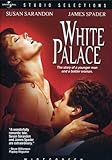White Palace
The book White Palace was made
into the movie White Palace.
Movie details for White Palace
The movie was released in
1990 and directed by Luis Mandoki, who also directed Message in a Bottle (1999).
White Palace was produced by Universal Studios.
More information on the movie is available on Amazon.com and also IMDb.
Actors on this movie include Susan Sarandon, James Spader, Jason Alexander, Kathy Bates, Eileen Brennan, Steven Hill, Rachel Chagall, Corey Parker, Renée Taylor, Jonathan Penner, Barbara Howard, Kim Myers, Hildy Brooks, Mitzi McCall, K.C. Carr, Glenn Savan, Fannie Belle Lebby, Vernon Dudas, Maryann Kopperman and Maria Pitillo.
|
 |
Read More About This Movie
Glenn Savan's depressing and self-loathing novel about a 27-year-old upper-class Jewish widower mired in self-pity after his beloved wife dies, and who finds love and sexual rebirth with a trailer-trash older woman, was brought to the big screen by the co...
Read MoreGlenn Savan's depressing and self-loathing novel about a 27-year-old upper-class Jewish widower mired in self-pity after his beloved wife dies, and who finds love and sexual rebirth with a trailer-trash older woman, was brought to the big screen by the competent director Luis Mandoki (When a Man Loves a Woman, Message in a Bottle). But the savage irony in Savan's book has been face-lifted by screenwriters Ted Tally (The Silence of the Lambs) and Alvin Sargent (Ordinary People) into something else entirely: what passes for low-rent "slumming" in Hollywood means hiring sexy Susan Sarandon to play Nora Baker, the poor, uneducated 43-year-old waitress in a White Palace burger joint who strikes up an unlikely relationship with sad Max Baron (James Spader). Widower Max attends a bachelor party for best pal Neil (Jason Alexander) and discovers that the local White Palace has stiffed the boys a whopping six burgers. Max barges into the joint, bent on getting his money back, and meets a testy Nora, who is bemused at the young man's insolence. While driving home, Max stops abruptly at a bar for a drink. Inside, Nora is nursing a vodka and takes a shine to the tuxedo-clad, handsome, and morose younger man. He gives her a lift, she seduces him, and the rest of the movie examines how two such opposites in manners and morals can find happiness. The only common bond they have is great sex and a private tragedy. White Palace nudges at the dark journey and the smashing of illusion that was at the heart of the novel, but there is still a fairy-tale element to the film that negates the earthy essence that distinguished the book. In Mandoki's vision, White Palace is about overcoming class, family, and outside opinion to find true love. In Savan's book, Max wastes into decline while Nora ultimately thrives in the quest for truth, redemption, and self-forgiveness. She becomes his salvation only after he stops hating himself. But mainstream Hollywood shuns making "protagonists" so mad, bad, or sad, and as such, too much glitter is tossed on Spader, while Sarandon, as usual, is the only one who seems to embody and understand her character's angst. She deserved her Oscar for Nora, not the nun in Dead Man Walking. --Paula Nechak
